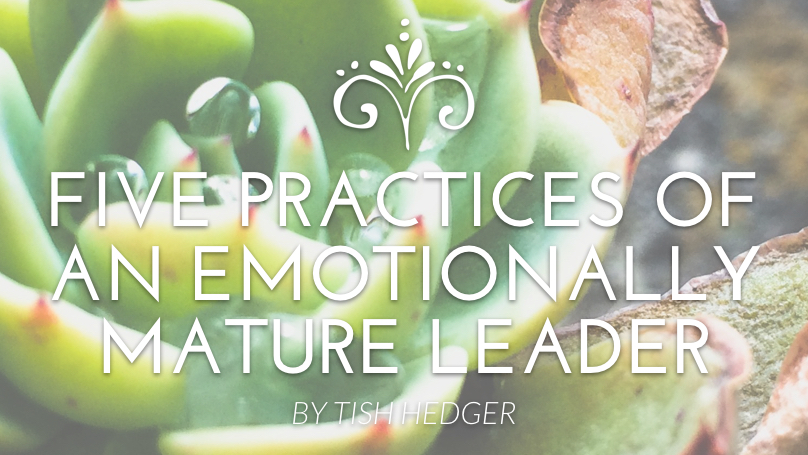Guest Writer: Tish Hedger
When you think of emotional maturity what do you think of? Do you think of someone who doesn’t blink an eye at human critique, disappointments, relational hurt, strenuous schedules, or an unexpected bill? Some zen goddess whose inner thoughts are like a peaceful field with wildflowers blowing in the wind? Emotional maturity is not the ability to renounce certain emotions never to feel them again, but the wisdom to understand and manage your emotions appropriately. Controlling the outward reaction to our emotions is not enough. Sure, we want to avoid mishandling our emotions and negatively affecting someone that we are leading. Beyond this, emotional maturity is vital for the soul care of a leader. We can control our outward responses, while negative emotions take a serious toll on the health of our heart and mind causing burnout, discouragement, or much worse.
I want to give you 5 key practices of an emotionally mature leader.
The more you know the more you realize you don’t know, and you are ok with that.
The emotionally mature leader is not living under some pressure to have all the answers or be what every situation needs at all times. This freedom ‘to not know’ is the freedom to still be growing and in process. It’s the freedom from fear of failure, and the reminder to boast in Christ only.
Extend grace to yourself every day.
Self-awareness is key, but one cannot practice productive self-awareness without first being committed to extending grace to oneself. The enemy loves to hijack self-awareness and use it as a weapon to distract and discourage. It’s God’s kindness that leads us to repentance, his goodness that motivates us to growth. In the moments we see our frailty and sin, may we boldly elbow shame out of our way as we unapologetically seize our gospel grace.
Foster a culture of self-awareness in your inner life.
You cannot manage emotions appropriately if you are not first aware of their existence. It is important we own the full reality of our emotions, so that they can be the starting block to growth. We prioritize self-awareness because it brings a clear understanding of ourselves, and enables us to trouble shoot our thoughts. If you can identify your negative emotions they will shed light on harmful thinking that is present. This will help smoke out the lies and sinful thoughts that if left unchecked can cause great emotional turmoil.
Create space between your emotions and your reactions.
Some of this comes down to good old-fashioned self-control. However, when you are free from fear of failure, extending grace to yourself, and practicing self-awareness regularly you have built wise practices into your life that will help you stop and think before reacting. Part of this also requires knowing when you are in over your head and need help.
Know when to ask for help and seek support.
The emotionally mature leader realizes that sometimes it will be too much to handle alone. They need time with their spouses, trusted friends, a pastor, or a counselor to process life and gain the support needed to weather a difficult season.
What practices would you add to this list?
Thanks to our friends at North American Mission Board and Tish Hedger for the content of this article, visit namb.net to read more.



